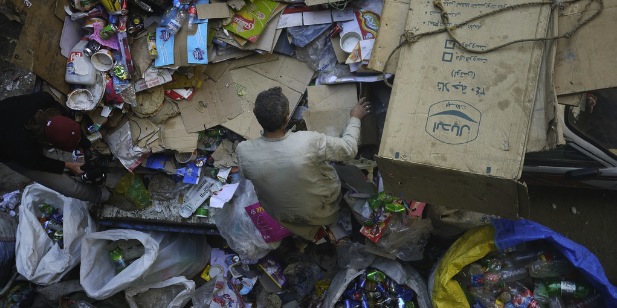Zabaleen
JUSTIN KRAMER’S DOCUMENTARY ABOUT THE GARBAGE COLLECTORS OF CAIRO

The hell of the mountain is better than the heaven of the Government. Even if that takes me to jail [I will say it]. The hell of the mountain is better than the heaven of the Government.
So Mourad Bashari bravely proclaims in the upcoming film, Zabaleen (Arabic for ‘garbage collectors’), which documents the ongoing struggles, and entrepreneurial and environmental achievements of a community of garbage collectors who collect, hand-sort, and recycle the 15,000 tonnes of domestic refuse produced by Cairo’s 17.8 million residents every day. Described as ‘a story of love, patience and resilience’, Zabaleen is directed by Justin Kramer, a filmmaker and mentor at the Doha Film Institute.
Zabaleen focuses its lens on life through the eyes of Mourad Bashari and his family of eleven children. The family live at the foot of a mountain on the outskirts of Cairo in a place called Manshayet Nasser, or as it is more commonly referred to, ‘Garbage City’. Mourad and his sons are zabaleen, and all of the family’s income is generated in this way - as is the case with Cairo’s 70,000-odd people with the same livelihood. Kramer’s film chronicles the daily life and hardships faced by the family alongside religious tensions, an ongoing revolution, and the imminent threat to their way of life instigated by the Government’s plans to employ large corporations to gather the garbage, and uproot and move the community elsewhere.
‘The first time you see Cairo, it’s like the end of the world’, Kramer reflects. ‘There’s such beauty in the chaos of it - it’s such a visual place. It’s hard to really say it’s like anywhere else on earth’. Far from the hustle and bustle of Cairo, Kramer grew up on the farm fields of southern New Jersey. With his father being a blue-collar farmer - a man of manual labour - Kramer found many parallels between life in Egypt’s capital city, and life in parts of the US similar to New Jersey. ‘… Landfills, guys working sun up to sun down getting their hands dirty, just so they can feed their families. I saw a lot of reflections of Mourad in things that I learned from my father when I was young, so it was very familiar to me in a strange way’, Kramer notes.
Still, Kramer had much to learn. ‘I had to spend a lot of time with these families before they trusted me enough. They’re very marginalised. What they do is sort of taboo, and they were reluctant to open up to an American guy who barely speaks the same language’, he admits.
In order to complete the filming for the documentary, Kramer immersed himself in the beauty and chaos of Cairo for three years. On capturing Mourad and his family on camera, Kramer notes that ‘it almost feels like infiltration, you know. You have to gain their trust; you have to make them understand that you’re not there to exploit them or show them in a negative light’. In the end, Kramer eventually became very attached to Mourad’s family, and now goes so far as to refer to them as his second family. ‘Sometimes Mourad will call me three times a week. We don’t even speak the same language, but after two minutes, he’ll say “I just wanted to hear your voice”‘.
In April 2012, a near-complete version of Zabaleen was screened at Harvard’s Peabody Museum, as part of a lecture entitled Garbage City and the Informal Economy. Kramer will be in Cairo from July 20th-29th to complete filming, and the documentary is scheduled to be released in August 2012.
|
Nidhi Zakaria Eipe is a writer, poet, and collaborative artist. Her work has appeared in T Qatar: The New York Times Style Magazine, TED, Dissident Voice, and Culture Unplugged, among other media organisations. Currently residing in Doha, Nidhi works with a number of international humanitarian organizations, with a special focus on education, spirituality, and the arts. |
Comments
Powered by Facebook Comments


















